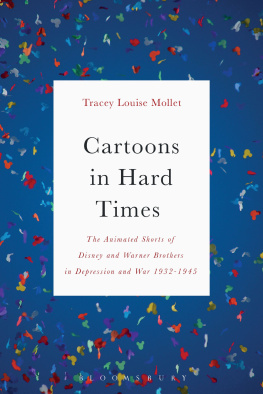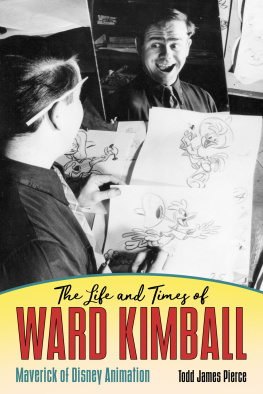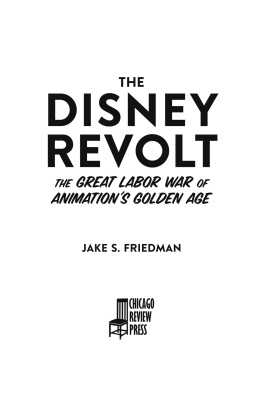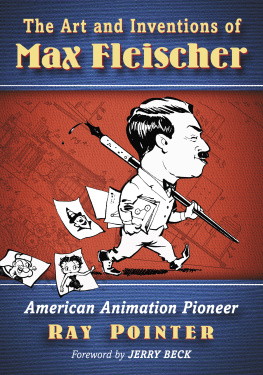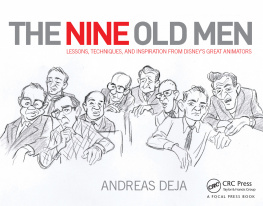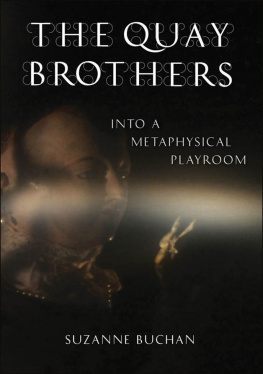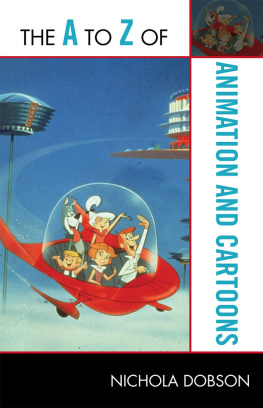Cartoons in Hard Times
For Neil
Cartoons in Hard Times
The Animated Shorts of Disney and
Warner Brothers in Depression
and War 19321945
Tracey Louise Mollet
Bloomsbury Academic
An imprint of Bloomsbury Publishing Plc

Contents
| The Three Little Pigs (1933). Walt Disney Treasures. |
| The Wise Little Hen (1934). Walt Disney Treasures. |
| Bosko in Person (1933). Looney Tunes Golden Collection. |
| Modern Inventions (1937) . Walt Disney Treasures. |
| The Grasshopper and the Ants (1934).Walt Disney Treasures. |
| Mickeys Pal Pluto (1934). Walt Disney Treasures. |
| Moving Day (1936). Walt Disney Treasures. |
| Porkys Poppa (1938). Looney Tunes Golden Collection. |
| Porkys Road Race (1937). Looney Tunes Golden Collection. |
| Self Control (1938). Walt Disney Treasures. |
| Boskos Picture Show (1933). Looney Tunes Golden Collection. |
| Three Little Wolves (1936). Walt Disney Treasures. |
| The Thrifty Pig (1941). Walt Disney Treasures. |
| She Was an Acrobats Daughter (1937). Looney Tunes Golden Collection. |
| Donalds Better Self (1938). Walt Disney Treasures. |
| Donalds Decision (1942). Walt Disney Treasures. |
| Porkys Poultry Plant (1936). Looney Tunes Golden Collection. |
| What Price Porky (1938). Looney Tunes Golden Collection. |
| Old Glory (1939). Looney Tunes Golden Collection. |
| Old Glory (1939). Looney Tunes Golden Collection. |
| Detouring America (1939). Looney Tunes Golden Collection. |
| Aviation Vacation (1941). Looney Tunes Golden Collection. |
| Holiday Highlights (1940). Looney Tunes Golden Collection. |
| The Fighting Sixty Ninth Half (1941). Looney Tunes Golden Collection. |
| Meet John Doughboy (1941). Looney Tunes Golden Collection. |
| Rookie Revue (1941). Looney Tunes Golden Collection. |
| The New Spirit (1942). Walt Disney Treasures. |
| Any Bonds Today? (1942). Looney Tunes Golden Collection. |
| Spirit of 43 (1943). Walt Disney Treasures. |
| Der Fuehrers Face (1943). Walt Disney Treasures. |
| Der Fuehrers Face (1943). Walt Disney Treasures. |
| Education for Death (1943). Walt Disney Treasures. |
| Reason and Emotion (1943). Walt Disney Treasures. |
| Chicken Little (1943). Walt Disney Treasures. |
| Food Will Win the War (1942). Walt Disney Treasures. |
| Food Will Win the War (1942). Walt Disney Treasures. |
| Out of the Frying Pan Into the Firing Line (1942). Walt Disney Treasures. |
| Fall Out, Fall In (1943). Walt Disney Treasures. |
| The Ducktators (1942). Looney Tunes Golden Collection. |
| The Ducktators (1942). Looney Tunes Golden Collection. |
| Fifth Column Mouse (1943). Looney Tunes Golden Collection. |
| Scrap Happy Daffy (1943). Looney Tunes Golden Collection. |
| Plane Daffy (1944). Looney Tunes Golden Collection. |
| Herr Meets Hare (1945). Looney Tunes Golden Collection. |
There are so many people I would like to thank for helping me to accomplish this lifelong dream. First and foremost, I would like to thank the late Philip M. Taylor, without whom this project would not have existed. His belief and enthusiasm for the subject was what inspired me to realize that combining my two passions of History and Disney in academic research was possible. Secondly, I would like to thank all of my colleagues, past and present, at the School of Media and Communication at the University of Leeds. Thirdly, I would like to thank all the fantastic staff at the Margaret Herrick Library in Beverley Hills, the University of California Los Angeles Archives, the Warner Brothers Archives at the University of Southern California and the American Film Institute Archives. I would also like to thank all of my wonderful tutors, throughout my educational journey, but most especially Jonathan Davies, Steve Donlan, Jay Sexton and John Watts.
My biggest thanks, however, go to my family and friends, and my partner, Neil, to whom I would like to dedicate this book. I can never thank you enough for all of the support you have given me over the past three years.
| AAA | Agricultural Adjustment Administration |
| AFI | American Film Institute |
| CIAA | Centre for Inter-American Affairs |
| CWA | Civil Works Administration |
| FBI | Federal Bureau of Investigation |
| FDR | Franklin Delano Roosevelt |
| FERA | Federal Emergency Relief Administration |
| FHA | Federal Housing Association |
| FSA | Farm Security Administration |
| LT | Looney Tunes |
| MM | Merrie Melodies |
| NRA | National Recovery Administration |
| OIAA | Office of Inter-American Affairs |
| OSS | Office of Strategic Services |
| OWI | Office of War Information |
| PCA | Production Code Administration |
| SA | Sturmabteilung |
| SNAFU | Situation Normal All F**ked Up |
| UCLA | University of California Los Angeles |
| USC | University of Southern California |
| WPA | Works Progress Administration |
In the summer of 1941, Nelson Rockefeller and John Hay Whitney approached Walt Disney to make a series of animated shorts for the Office of Inter-American Affairs (OIAA). The OIAA was formed in 1940 and was primarily concerned with the financial problems of Latin American countries, but its role became limited to cultural relationships following the establishment of the Board of Economic Warfare (McCann 1973, 148). Rockefeller and Whitney wanted Disney to tour South America as a goodwill ambassador, believing that Disneys animation could be fundamentally important at curbing pro-Nazi feeling there. They offered to underwrite the cost of the trip and promised Disney $50,000 for making animated shorts fostering good relations between Latin America and the United States (Jackson 1993, 37). Disney set off with two dozen of his best animators in August 1941, leaving his studio in the aftermath of a disruptive strike, with the remaining artists fumbling through the animation for Dumbo (1941). Disney had accepted his first state contract to produce propaganda through the medium of animation.
Nearly six months prior to the Japanese attack on Pearl Harbor, the Schlesinger Studios released Meet John Doughboy (1941) . It was distributed by Warner Brothers, who were well known for the political undertones of their feature films. Released the day after 4 July and just a short week following Germanys invasion of the Soviet Union, this animated production was unquestionably interventionist in its tone, calling for Americans to support the war and oppose anti-draft legislation. Despite the fact that the United States was not yet at war, these two studios quickly mobilized to present political messages through the medium of animation, recognizing its strength as an ideological platform.

